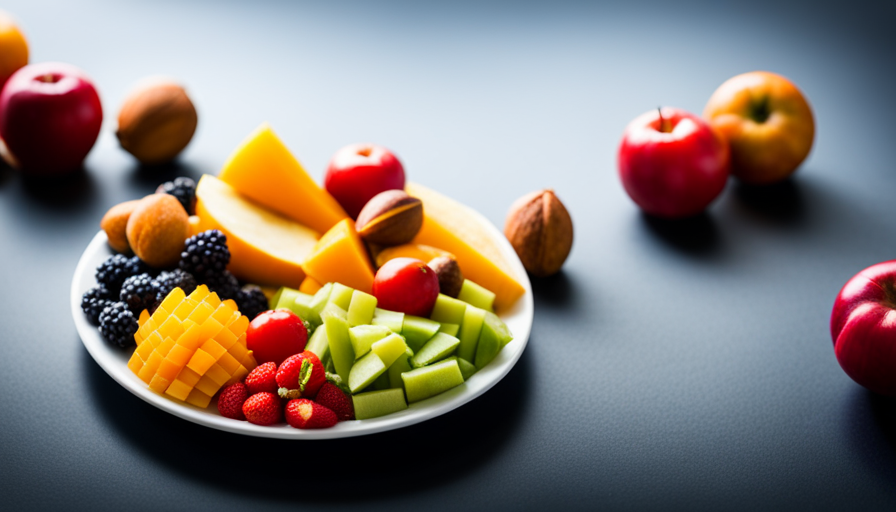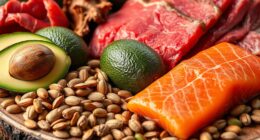Hello everyone! Have you ever wondered why the raw food diet is gaining popularity? Let me tell you, it’s a complete game-changer!
The raw food diet, also known as raw veganism, is a lifestyle that revolves around consuming uncooked and unprocessed foods, primarily fruits, vegetables, nuts, and seeds. Now, you might be thinking, ‘Why on earth would I want to eat raw food?’ Well, let me assure you, this diet promises some incredible benefits. Not only can it help you shed those unwanted pounds, but it also boasts improved digestion, increased energy levels, and an overall boost in well-being.
In this article, we’ll explore the promises of the raw food diet, discuss how to incorporate more raw fruits and vegetables into your diet, share some delicious recipes and meal ideas, and address any potential challenges or considerations. So, let’s dive in and discover if the raw food diet is the right fit for you!
Key Takeaways
- The raw food diet promises benefits such as weight loss, improved digestion, increased energy levels, and overall well-being.
- Studies show that individuals on the raw food diet can experience an average weight loss of 10 pounds in one month.
- The diet is low in calories, high in fiber, and nutrient-dense, which helps control appetite and promote feelings of fullness.
- By embracing the raw food lifestyle, individuals can experience increased energy levels and improved mental clarity.
What is the Raw Food Diet?
The Raw Food Diet offers a natural and unprocessed approach to nutrition, promising improved health and vitality. This diet primarily consists of consuming uncooked and unprocessed foods such as fruits, vegetables, nuts, seeds, and sprouted grains. Proponents of this diet claim that it provides numerous benefits, including increased energy levels, improved digestion, enhanced immune function, and weight loss.
By eating foods in their raw and natural state, it’s believed that essential nutrients, enzymes, and antioxidants are preserved, leading to better overall health. However, it’s important to consider potential health risks associated with the Raw Food Diet. One concern is the potential for nutrient deficiencies. Since this diet eliminates certain food groups like meat, dairy, and grains, it may be challenging to obtain adequate amounts of nutrients like protein, calcium, iron, and vitamin B12.
Another potential risk is the increased risk of foodborne illnesses, as consuming raw foods can expose individuals to harmful bacteria and parasites. Transitioning to the subsequent section about the weight loss benefits of the raw food diet, it’s important to note that weight loss is often a desired outcome for individuals following this diet.
Weight Loss Benefits of the Raw Food Diet
Lose weight easily and naturally by adopting a raw food lifestyle, with studies showing that individuals on this regimen have experienced an average weight loss of 10 pounds in just one month.
The raw food diet, which consists of consuming uncooked and unprocessed plant-based foods, offers numerous health benefits, including weight loss. The raw food diet is low in calories and high in fiber, which can help control appetite and promote feelings of fullness. Additionally, raw foods are typically nutrient-dense, providing essential vitamins, minerals, and antioxidants that support overall health.
The weight loss benefits of the raw food diet can be attributed to several factors. Firstly, raw foods are naturally low in calories, making it easier to create a calorie deficit and lose weight. Secondly, the high fiber content of raw foods helps to regulate digestion and prevent overeating. Furthermore, the emphasis on whole, unprocessed foods in the raw food diet can lead to improved insulin sensitivity and blood sugar control, which are important for weight management.
In addition to weight loss, the raw food diet has been associated with other health benefits, such as improved digestion and increased energy levels. By incorporating more raw fruits, vegetables, and nuts into your diet, you can provide your body with essential enzymes and fiber that support healthy digestion.
This transition into the subsequent section about ‘improved digestion on the raw food diet’ highlights the holistic benefits of adopting a raw food lifestyle.
Improved Digestion on the Raw Food Diet
Experience the incredible benefits of improved digestion when you embrace the raw food lifestyle. The raw food diet has been praised for its positive impact on gut health, leading to a variety of benefits for individuals who adopt this way of eating.
Here are some key benefits of the raw food diet on digestion:
-
Enhanced Nutrient Absorption: Raw foods are rich in enzymes, which aid in the breakdown and absorption of nutrients. This can improve the efficiency of digestion and ensure that your body is able to extract the maximum amount of nutrients from the foods you eat.
-
Increased Fiber Intake: Raw fruits, vegetables, nuts, and seeds are all excellent sources of fiber. A high-fiber diet can promote regular bowel movements, prevent constipation, and support a healthy digestive system.
-
Reduced Inflammation: The raw food diet is naturally low in processed foods, additives, and preservatives, which can contribute to inflammation in the gut. By avoiding these inflammatory substances and consuming a diet rich in whole, unprocessed foods, individuals on the raw food diet may experience a reduction in digestive inflammation.
Improved digestion is just one of the many benefits of the raw food diet. By nourishing your body with nutrient-dense foods, you can also expect increased energy levels.
Increased Energy Levels with the Raw Food Diet
Boost your energy levels and feel revitalized by embracing the raw food lifestyle! One of the main promises of the raw food diet is increased stamina and improved mental clarity. By consuming raw, unprocessed fruits, vegetables, nuts, and seeds, you provide your body with a rich source of nutrients and enzymes that can enhance your energy levels.
When you eat raw foods, your body doesn’t have to work as hard to break down and digest complex cooked foods. This results in a more efficient digestion process, freeing up energy that can be used for other bodily functions. As a result, many raw food enthusiasts report feeling more energized throughout the day.
Additionally, the raw food diet is abundant in vitamins, minerals, and antioxidants, which are essential for optimal brain function. These nutrients support mental clarity and focus, allowing you to tackle tasks with increased productivity and concentration.
By embracing the raw food lifestyle, you can experience a boost in overall well-being. In the next section, we will explore how the raw food diet can enhance your immune system and promote a strong, healthy body.
Boosting Overall Well-being through Raw Food
Can you imagine feeling more vibrant and healthy by simply incorporating raw, unprocessed fruits, vegetables, nuts, and seeds into your daily meals? The raw food diet promises just that – an overall boost to your well-being. By consuming these nutrient-dense foods in their natural state, you can enhance your immunity and reduce inflammation in the body.
One of the key benefits of the raw food diet is its ability to boost the immune system. Raw foods are rich in vitamins, minerals, and antioxidants that can strengthen your body’s defenses against infections and diseases. Additionally, the enzymes present in raw foods can help improve digestion and absorption of nutrients, further supporting your immune system.
Reducing inflammation is another advantage of the raw food diet. Many processed and cooked foods can trigger inflammation in the body, leading to various health issues. Raw foods, on the other hand, contain anti-inflammatory compounds that can help alleviate inflammation and promote better overall health.
To emphasize the importance of raw, unprocessed foods, consider the following table:
| Raw Foods | Benefits |
|---|---|
| Fruits | High in antioxidants and fiber |
| Vegetables | Packed with vitamins and minerals |
| Nuts and seeds | Good source of healthy fats and protein |
| Sprouts | Rich in enzymes and phytonutrients |
| Leafy greens | High in chlorophyll and essential nutrients |
Incorporating raw, unprocessed foods into your diet can have a positive impact on your overall well-being. By boosting immunity and reducing inflammation, these foods can help you feel more vibrant and healthy. Transitioning into the subsequent section, it is important to understand the significance of whole, unprocessed foods in achieving optimal health.
The Importance of Whole, Unprocessed Foods
Incorporating whole, unprocessed foods into your daily meals is essential for achieving optimal health and vitality. Whole foods are natural, unrefined, and unprocessed, which means they retain their original nutrients and are free from additives. Consuming these foods provides numerous benefits for your overall well-being.
Firstly, whole foods are rich in vitamins, minerals, and antioxidants that support your immune system and help prevent chronic diseases. They also contain fiber, which aids in digestion and promotes a healthy gut. Additionally, whole foods are low in added sugars, unhealthy fats, and sodium, making them a healthier choice for your heart health. Moreover, unprocessed foods are less likely to cause inflammation in the body, which can lead to various health issues.
By incorporating whole, unprocessed foods into your diet, you can experience increased energy levels, improved digestion, and a strengthened immune system. In the next section, we will delve into the benefits of incorporating raw fruits and vegetables into your diet, which can further enhance your overall well-being.
Incorporating Raw Fruits and Vegetables into Your Diet
Start by adding a colorful array of fresh fruits and vegetables to your plate, allowing their vibrant hues to paint a visually appealing and nutrient-rich masterpiece. Incorporating raw fruits and vegetables into your diet can provide numerous health benefits.
Here are some tips for transitioning to a raw food diet:
- Start gradually: Begin by incorporating a few raw fruits and vegetables into your meals and gradually increase the amount over time.
- Experiment with different varieties: There’s a wide variety of fruits and vegetables available, so try different ones to find the ones you enjoy the most.
- Include a variety of colors: Different colored fruits and vegetables offer different nutrients, so aim to include a variety of colors in your diet.
- Use creative preparation methods: Raw fruits and vegetables can be enjoyed in a variety of ways, such as salads, smoothies, and wraps.
- Seek inspiration from recipes: Look for raw food recipes online or in cookbooks to find new and exciting ways to incorporate raw fruits and vegetables into your meals.
By incorporating these tips, you can easily add more raw fruits and vegetables to your diet, paving the way for a healthier lifestyle.
In the next section, we’ll explore some delicious raw food recipes and meal ideas.
Raw Food Recipes and Meal Ideas
Get ready to tantalize your taste buds with these mouthwatering raw food recipes and meal ideas that’ll leave you craving for more!
Raw food snacks are a great way to satisfy your hunger while still sticking to a healthy, unprocessed diet. Try making a batch of homemade kale chips by tossing fresh kale leaves with olive oil, sea salt, and your favorite spices, then dehydrating them until crispy.
Another delicious option is raw energy balls made with dates, nuts, and seeds. These bite-sized treats are not only packed with nutrients but also provide a quick burst of energy.
When it comes to raw food desserts, the benefits are endless. Raw desserts are typically made with whole, natural ingredients like fruits, nuts, and raw cacao. They’re rich in vitamins, minerals, and antioxidants, making them a guilt-free indulgence.
Try making a raw chocolate avocado mousse by blending ripe avocados, raw cacao powder, dates, and a splash of almond milk. The result is a creamy and decadent dessert that’ll satisfy your sweet tooth without any added sugars or unhealthy fats.
As you explore the world of raw food recipes and meal ideas, it’s important to consider the potential challenges and considerations of the raw food diet.
Potential Challenges and Considerations of the Raw Food Diet
Navigating the raw food journey can be likened to embarking on a winding path, as one must overcome potential hurdles and keep in mind various factors before fully embracing this nutrient-rich lifestyle. While the raw food diet offers numerous benefits, it also comes with its fair share of challenges and considerations. Here are some important factors to keep in mind:
-
Nutrient deficiencies: Without careful planning, it can be challenging to meet all of your nutritional needs on a raw food diet. Certain nutrients, such as vitamin B12 and iron, are predominantly found in animal products or are better absorbed through cooking.
-
Food safety: Raw food diets carry a higher risk of foodborne illnesses. Eating raw or undercooked foods increases the chances of consuming harmful bacteria or parasites.
-
Digestive issues: Some people may experience digestive discomfort when transitioning to a raw food diet, as it’s typically higher in fiber, which can cause bloating and gas.
-
Social challenges: Adhering to a raw food diet can be socially isolating, as it may limit your options when dining out or attending social gatherings.
-
Time and effort: Preparing raw meals often requires more time and effort compared to cooking. It may involve soaking, sprouting, and dehydrating various ingredients.
Considering these challenges and considerations, it’s essential to carefully evaluate whether the raw food diet is right for you.
Is the Raw Food Diet Right for You?
Considering the potential challenges and considerations, it’s important to carefully evaluate if the raw food lifestyle aligns with your needs and preferences.
The raw food diet, like any dietary approach, has its pros and cons. On one hand, proponents claim that it can lead to weight loss, increased energy levels, improved digestion, and reduced inflammation. Raw foods are typically rich in vitamins, minerals, and enzymes that can support overall health.
On the other hand, it’s important to note that the raw food diet may not be suitable for everyone. Some potential challenges include difficulty meeting nutrient needs, limited food choices, and concerns about food safety. Additionally, cooking certain foods can enhance their nutritional value and make them easier to digest.
It’s also worth mentioning that the long-term health effects of the raw food diet are still not fully understood. While some studies suggest that it may offer health benefits, more research is needed to draw definitive conclusions.
Therefore, before embarking on the raw food diet, it’s crucial to consult with a healthcare professional and consider your individual health goals and needs.
Frequently Asked Questions
Can the raw food diet cure specific medical conditions?
The raw food diet’s effectiveness in curing specific medical conditions is not supported by scientific evidence. While some proponents claim that it can treat various ailments, such as diabetes or cancer, there is no substantial research to back up these claims.
It’s important to approach any diet with caution and consult with a healthcare professional before making significant changes to your eating habits.
Are there any potential risks or side effects associated with the raw food diet?
There are potential dangers and long-term effects associated with the raw food diet. One potential danger is the risk of nutrient deficiencies, as certain nutrients are more easily absorbed when cooked.
The diet may also lead to weight loss, which can be a concern for individuals who are already underweight.
Additionally, there is a risk of bacterial contamination from consuming raw or undercooked foods.
It’s important to consult with a healthcare professional before starting any new diet to ensure it’s safe and suitable for individual needs.
Can I still get all the necessary nutrients on a raw food diet?
Meeting nutritional needs on a raw food diet can be challenging, but it promises increased energy and weight loss. However, potential deficiencies may arise without proper planning. Important nutrients like protein, calcium, and vitamin B12 may be lacking. Incorporating a variety of fruits, vegetables, nuts, and seeds can help meet these needs. It’s crucial to consult with a healthcare professional to ensure you’re getting all the necessary nutrients while following a raw food diet.
Is it possible to gain weight on the raw food diet?
Gaining weight on the raw food diet is possible, but it depends on the individual’s food choices and portion sizes. Raw fruits, vegetables, nuts, and seeds can be calorie-dense and provide healthy fats, fiber, and protein. However, some people may struggle to consume enough calories to meet their weight gain goals.
It’s essential to ensure a balanced intake of nutrients and consult with a healthcare professional or nutritionist for personalized guidance.
Are there any specific guidelines or recommendations for transitioning to a raw food diet?
When transitioning to a raw food diet, it’s important to follow certain guidelines. The process involves gradually increasing the amount of raw foods in your diet while reducing cooked and processed foods.
Recommended foods include fresh fruits, vegetables, nuts, seeds, and sprouted grains. It’s also important to ensure a balanced intake of nutrients, such as protein and B vitamins.
By following these guidelines, individuals can successfully transition to a raw food diet and enjoy its potential health benefits.
– Does the Raw Food Diet Guarantee Significant Transformation in 90 days?
Curious about the raw food diet transformation before and after? The 90-day mark might bring remarkable changes. However, individual results vary based on factors like adherence and starting point. It’s essential to consult a healthcare professional before embarking on any significant dietary change.
Conclusion
In conclusion, the raw food diet offers numerous potential benefits. These include weight loss, improved digestion, increased energy levels, and overall well-being. While some may be skeptical about the sustainability of this diet or the potential challenges of incorporating raw foods into their daily meals, it’s important to remember that everyone’s dietary needs and preferences are different. By gradually incorporating more raw fruits and vegetables into your diet and exploring raw food recipes, you can discover if the raw food diet is right for you. Don’t be afraid to experiment and find what works best for your body and lifestyle.










